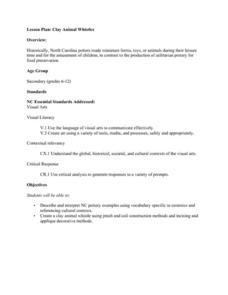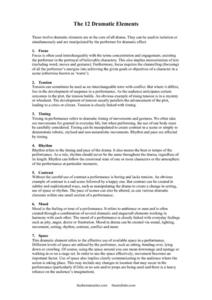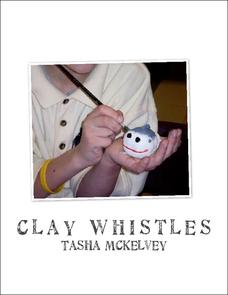Project Articulate
Textured Landscapes with Grant Wood
Explore the world of textured landscapes through the eyes of the famous artist, Grant Wood. Here is an elementary art lesson in which scholars learn about Grant Wood's life, view his work, draw their own textured landscape, and then...
NPR
Theatre Vocabulary
From actor to volume, the 90 terms on a theatre vocabulary list are must knows for any student of the dramatic arts.
Pittsburgh Ballet Theatre
The Nutcracker Teacher Resource Guide
Clara becomes Marie, The Mouse King becomes a rat, and the Shadyside section of Pittsburgh becomes the setting for a modern interpretation of Tchaikovsky's famous ballet. Intended as a resource guide for a 2012 performance, the...
Education.com
Pablo Picasso
Introduce your class to one of the most famous artists of the twentieth century. After reading a brief biography of Pablo Picasso, pupils create their own collages on the next page on the theme of music.
Lee County High School
Clay Animal Whistles
Investigate North Carolina pottery history by creating clay animal whistles, a traditional leisure activity in the region. They research a particular animal and jot down its attributes to include in their project. Find step-by-step...
David Elementary
Structural Elements of Drama
The world may indeed be a stage, and players certainly need to know drama vocabulary. This list of 16 terms (and their definitions) often found in scripts will prompt actors to perform their role.
York Catholic
Elements of Drama
Introduce young actors to the key elements of performance with this handout that defines key staging terms and activities.
Maryland Department of Education
The Concept of Identity Lesson 8: Propaganda in Visual Media
Visual and print propaganda are featured in a instructional activity that asks readers of A Separate Peace to examine the techniques used in propaganda from World War I, World War II, presidential elections, and in the novel.
Practical Pages
Famous Artist of the Month
Feature one famous artist a month with a series of portraits, biographies, and examples of their gallery. With masters such as Augustus Rodin, Francisco Goya, and Michelangelo, the resource provides opportunities every month for kids to...
Music Fun
Musical Instruments
Membranophones? Aerophones? How about strings? Percussion? You need not be a music instructor to benefit from a packet of 24 worksheets that introduce aspiring musicians to the various instrument families.
Music Fun
Time Signatures
You'll never miss a beat with a resource packet filled with puzzles, quizzes, and activity worksheets that focus on time signatures. Don't quaver or rest until you score this packet.
Music Fun
Overhead Transparencies
Classroom and studio music instructors will find this packet of 10 transparencies of major value. Images of treble and bass clefs, notes and rests, note values, time signatures, and music language are included. Nothing minor about this...
Music Fun
Recorder Fingering Worksheets
High notes and low notes. Sharps and flats. Recorder players perfect their fingering with a series of music worksheets that ask them to practice identifying correct fingering patterns and connecting these patterns to the...
Drama Teacher
The 12 Dramatic Elements
Plays are meant to be seen and so are these 12 elements that give plays the dramatic effect. Introduce young actors to these key terms and their explanations
Tasha McKelvey
Clay Whistles
Create clay whistles with your elementary or middle school learners. The project is outlined in great detail here, complete with step-by-step photographs, finished examples, a materials list, student handouts, and a rubric. Students...
Fun Music Company
Note Values
Note values are the focus of a short worksheet that asks young musicians to respond to short-answer questions and to complete a measure with notes of the appropriate value.
Fun Music Company
Compound Time
To demonstrate their understanding of simple and compound time signatures, young musicians complete a chart by drawing quarter or dotted quarter notes equal in value to the note groups shown.
Fun Music Company
Intervals
As part of their study of intervals, musicians are asked to draw the interval indicated above the notes provided on the worksheet.
Fun Music Company
Transposition
Up a perfect fifth, down an octave. Transposing a piece to suit the range of singers, and instrumentalists, is a key skill musicians must perfect. This worksheet explains how to transpose and gives learners a change to practice.
Fun Music Company
Working Out the Key
"Gimme an E minor!" Or any key for that matter. But how do you figure out the key of a piece of music? Here's a worksheet that shows young musicians three easy steps to help them identify the key of a piece of music.
Fun Music Company
The Harmonic Minor Scale
The harmonic minor scale, including the use of accidentals, is the focus of a one-page worksheet that includes instructional information and practice exercises.
Fun Music Company
Classification of Intervals
Major 2nd, Perfect 4th, Minor 3rd. The number and classification of intervals are the focus of a one-page worksheet that asks musicians to write the intervals above given notes and to indicate the classification of others.
Fun Music Company
Relative Major and Minor
It's all relative. Young music theorists are asked to count to three and identify the relative major and minor keys of keys that share the same signature.
Fun Music Company
Completing Measures with Rests
Rests. Eighth rests, quarter rests, and half rests are the focus of a one-page worksheet that asks music theory students to complete a series of measures with rests and bar lines.























